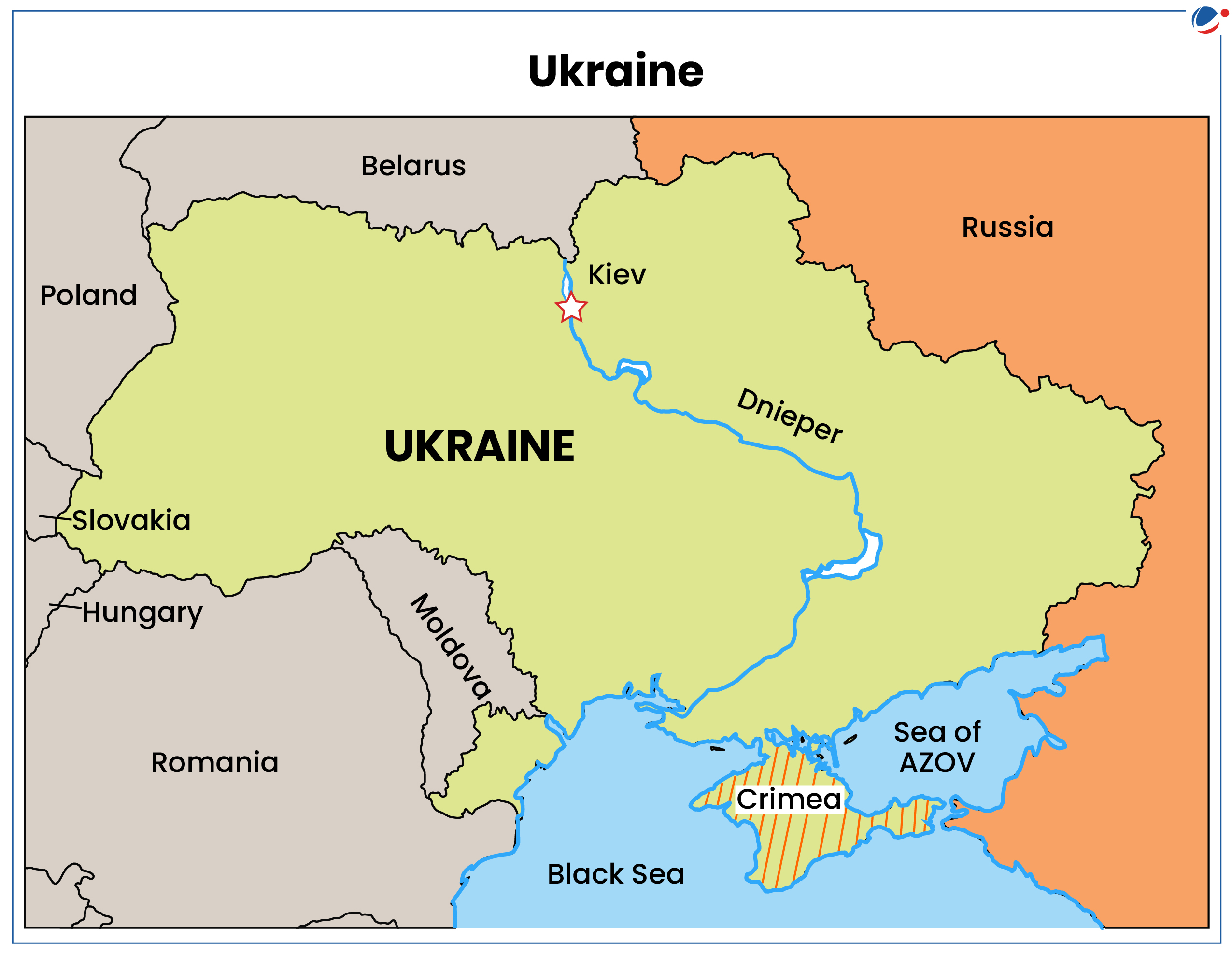Why in the News?
India's Prime Minister visited Ukraine for the first time since the establishment of diplomatic relations in 1992.
Key Highlights of the Visit

- Prospect: Both countries agreed to upgrade comprehensive partnership to a strategic partnership in future.
- BHISHM Cubes: India provided Ukraine Bharat Health Initiative for Sahyog Hita & Maitri (BHISHM) cubes under 'Aarogya Maitri' project.
- BHISM cubes are innovative portable hospitals and are designed to provide rapid medical assistance in emergencies
- Agreements signed: on agriculture and food industry, medical products regulation, Indian Humanitarian Grant Assistance and programme of cultural cooperation for year 2024-2028.
What is the Significance of PM's Visit to Ukraine?
- Mending fences with Ukraine: India's trip to Kyiv aims to reclaim lost bonds with Ukraine in the post-soviet era.
- Establish India as a Global Mediator: India is positioning itself as a peacemaker making it an eminent player at the global high table and aims to have influence beyond its South Asian neighbourhood.
- Moreover, India's peacemaker role is not just about resolving the Ukraine crisis but also enhance its global credibility compared to other emergent powers such as China.
- Shift in India's Neutrality in foreign policy: It showcases the shift from maintaining equal distance (Non-Alignment) from all countries to aiming for close ties with all countries.
- Moreover, India has maintained that it was never neutral but on side of peace in Russia-Ukraine conflict.
- Delicate Balancing Act between the West and Russia: With India's multi-alignment approach, it is showcasing India's delicate act of balancing between West and Russia during the on-going war.
- India's larger Europe Push: Earlier, India foreign relations with Europe have been focused on only Europe's big four countries Russia, Germany, France, and Britain. India's quest for Europe's peace makes a larger push towards Europe.
Role India can play in Mediation of Russia-Ukraine war
|
Significance of Ukraine for India
- Defence Cooperation: India's military hardware, primarily of Russian and Ukrainian origin, faces maintenance challenges due to the Russia-Ukraine war.
- Trade and Economy: Bilateral trade between the two countries reached US $ 3.386 billion (2021-22).
- Main items of export from Ukraine to India are agricultural items, metallurgical products, plastics and polymers.
- Pre-war, Ukraine was a significant source of sunflower oil for India.
- Pharmaceuticals, machinery, chemicals, food products etc. are the major Indian exports to Ukraine.
- Main items of export from Ukraine to India are agricultural items, metallurgical products, plastics and polymers.
- Post-War Recovery and Reconstruction: India and Ukraine agreed to explore the possibility of Indian companies being involved in Ukraine's reconstruction and recovery and it is expected to offer huge opportunities for India's strained labour market as well.
- Reformed Multilateralism: Ukraine's support reformed and expanded UNSC with India's permanent membership of UNSC to reflect global realities.
Challenges in India-Ukraine Relationship
- Russia-India Relations: India's historical ties with Russia complicate its ability to support Ukraine fully, leading to a delicate diplomatic balancing act.
- Decline in Trade: There has been significant reduction in the annual bilateral trade in goods since year 2022 due to on-going war. India's exports to Ukraine dropped by 22.8% while Ukraine's exports to India fell by 17.3%.
- Historical baggages: Ukraine's criticism of India's Nuclear Test, supply of defence equipment's to Pakistan and Kashmir policy has also hindered full level engagement.
Conclusion
India should position itself as a proactive mediator, consistently advocating for dialogue and peaceful resolution to bring conflicting parties to the negotiation table. Additionally, revitalizing trade relationships through improved ease of doing business, expanded market access in complementary areas, and harmonized standards and certification procedures will be crucial for long-term economic stability and cooperation





